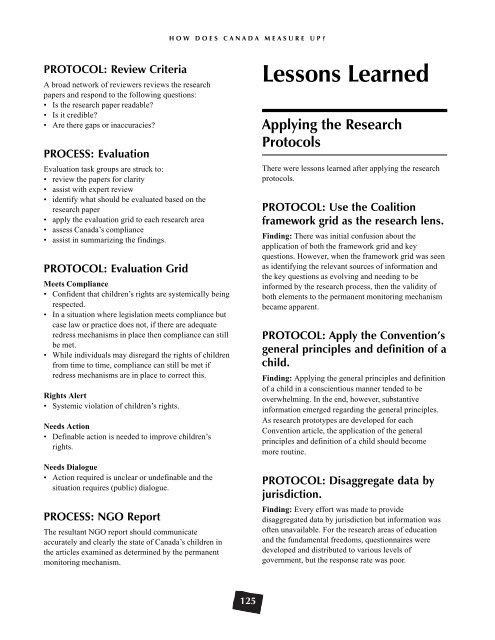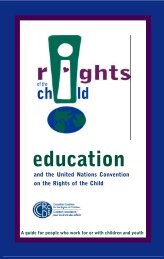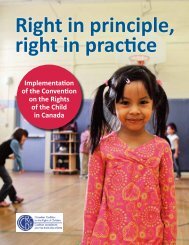Poste - Canadian Coalition for the Rights of Children
Poste - Canadian Coalition for the Rights of Children
Poste - Canadian Coalition for the Rights of Children
Create successful ePaper yourself
Turn your PDF publications into a flip-book with our unique Google optimized e-Paper software.
PROTOCOL: Review Criteria<br />
A broad network <strong>of</strong> reviewers reviews <strong>the</strong> research<br />
papers and respond to <strong>the</strong> following questions:<br />
• Is <strong>the</strong> research paper readable?<br />
• Is it credible?<br />
• Are <strong>the</strong>re gaps or inaccuracies?<br />
PROCESS: Evaluation<br />
Evaluation task groups are struck to:<br />
• review <strong>the</strong> papers <strong>for</strong> clarity<br />
• assist with expert review<br />
• identify what should be evaluated based on <strong>the</strong><br />
research paper<br />
• apply <strong>the</strong> evaluation grid to each research area<br />
• assess Canada’s compliance<br />
• assist in summarizing <strong>the</strong> findings.<br />
PROTOCOL: Evaluation Grid<br />
Meets Compliance<br />
• Confident that children’s rights are systemically being<br />
respected.<br />
• In a situation where legislation meets compliance but<br />
case law or practice does not, if <strong>the</strong>re are adequate<br />
redress mechanisms in place <strong>the</strong>n compliance can still<br />
be met.<br />
• While individuals may disregard <strong>the</strong> rights <strong>of</strong> children<br />
from time to time, compliance can still be met if<br />
redress mechanisms are in place to correct this.<br />
<strong>Rights</strong> Alert<br />
• Systemic violation <strong>of</strong> children’s rights.<br />
Needs Action<br />
• Definable action is needed to improve children’s<br />
rights.<br />
Needs Dialogue<br />
• Action required is unclear or undefinable and <strong>the</strong><br />
situation requires (public) dialogue.<br />
PROCESS: NGO Report<br />
The resultant NGO report should communicate<br />
accurately and clearly <strong>the</strong> state <strong>of</strong> Canada’s children in<br />
<strong>the</strong> articles examined as determined by <strong>the</strong> permanent<br />
monitoring mechanism.<br />
H O W D O E S C A N A D A M E A S U R E U P ?<br />
125<br />
Lessons Learned<br />
Applying <strong>the</strong> Research<br />
Protocols<br />
There were lessons learned after applying <strong>the</strong> research<br />
protocols.<br />
PROTOCOL: Use <strong>the</strong> <strong>Coalition</strong><br />
framework grid as <strong>the</strong> research lens.<br />
Finding: There was initial confusion about <strong>the</strong><br />
application <strong>of</strong> both <strong>the</strong> framework grid and key<br />
questions. However, when <strong>the</strong> framework grid was seen<br />
as identifying <strong>the</strong> relevant sources <strong>of</strong> in<strong>for</strong>mation and<br />
<strong>the</strong> key questions as evolving and needing to be<br />
in<strong>for</strong>med by <strong>the</strong> research process, <strong>the</strong>n <strong>the</strong> validity <strong>of</strong><br />
both elements to <strong>the</strong> permanent monitoring mechanism<br />
became apparent.<br />
PROTOCOL: Apply <strong>the</strong> Convention’s<br />
general principles and definition <strong>of</strong> a<br />
child.<br />
Finding: Applying <strong>the</strong> general principles and definition<br />
<strong>of</strong> a child in a conscientious manner tended to be<br />
overwhelming. In <strong>the</strong> end, however, substantive<br />
in<strong>for</strong>mation emerged regarding <strong>the</strong> general principles.<br />
As research prototypes are developed <strong>for</strong> each<br />
Convention article, <strong>the</strong> application <strong>of</strong> <strong>the</strong> general<br />
principles and definition <strong>of</strong> a child should become<br />
more routine.<br />
PROTOCOL: Disaggregate data by<br />
jurisdiction.<br />
Finding: Every ef<strong>for</strong>t was made to provide<br />
disaggregated data by jurisdiction but in<strong>for</strong>mation was<br />
<strong>of</strong>ten unavailable. For <strong>the</strong> research areas <strong>of</strong> education<br />
and <strong>the</strong> fundamental freedoms, questionnaires were<br />
developed and distributed to various levels <strong>of</strong><br />
government, but <strong>the</strong> response rate was poor.




